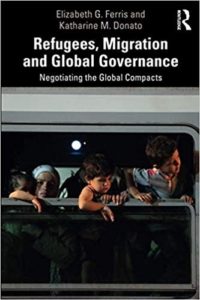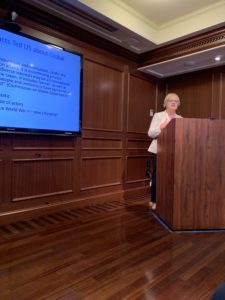Professor Elizabeth Ferris and Professor Katharine Donato presented their new book Refugees, Migration, and Global Governance: Negotiating the Global Compacts at a book talk on 11 September 2019. Following an introduction by Anne Richard, former Assistant Secretary of State during the Obama administration, the two professors outlined the context in which the two compacts were negotiated, briefly reviewed the content of the compacts and discussed their potential impact on global governance. The Global Compact on Refugees reaffirms principles of refugee protection and establishes several new mechanisms for more effectively sharing responsibility for refugees but does not create new norms. On the other hand, the Global Compact on Safe, Orderly, and Regular Migration provides – for the first time — a comprehensive framework on migration and represents a careful balance between the affirmation of migrants’ rights and states’ concerns with border security. The fact that the two compacts were adopted in 2018 by most governments in the world (though notably not the United States) represents an affirmation of multilateral approaches to migration although, as always, their success depends on whether and how the compacts are implemented.
Donald Kerwin, Executive Director of the Center for Migration Studies, and Kathleen Newland, founder and Senior Fellow of the Migration Policy Institute, then offered comments on the book. Both speakers emphasized that the book – the first on the global compacts – provides a useful and comprehensive overview of the two compacts. Kerwin emphasized the responsibility of state actors in coping with mass migration, the lack of protections for internally displaced people, and the cruelty of the United States’ recent immigration policies and practices. Newland commented on the remarkable yet limited nature of the new global compacts. In particular, she noted that the Global Compact on Refugees is a quite conservative document while the Global Compact for Migration has ‘something for everyone.’ In the Q&A, participants focused on the implications of the new compacts for the US government and particularly for those who are forced to leave their countries but who do not meet the criteria of the refugee definition. Most agreed that while these two new Global Compacts represent an important step forward in global governance of migration, much work will be needed to translate the compacts into action to improve the lives of refugees and migrants.



